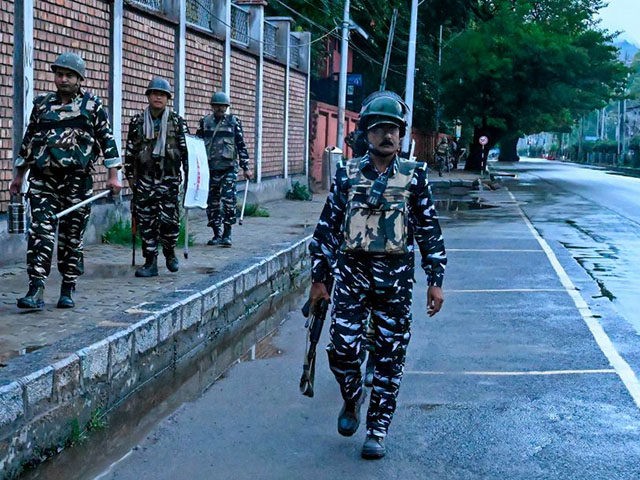Authorities in Indian-administered Kashmir have detained more than 1,300 people during an ongoing security lockdown intended to ward off a popular uprising in the country’s only Muslim-majority region, the Independent reported Wednesday.
The Independent learned from an unnamed senior police official that there were 350 politicians among the 1,300 arrested or detained in their homes.
In a move described as unprecedented in Kashmir’s recent history, India reportedly arrested “the entire leadership of all the region’s pro-India parties, including three former chief ministers.”
India’s Hindu nationalist-led government implemented a lockdown after stripping the portion of Kashmir controlled by New Delhi of its autonomy last week. As part of its intensified crackdown in Kashmir, India is also enforcing a communications blackout that includes the blocking of phone lines, the internet, and news outlets.
Citing security reasons, the Independent withheld the name of the author behind the article on the arrests in Indian Kashmir.
Several news outlets report that the lockdown is expected to last at least through Thursday, when India celebrates its independence.
On Wednesday, the Independent reported:
More than 1,300 people have now been arrested in Indian-administered Kashmir, as Narendra Modi’s government continued to enforce a complete lockdown in an attempt to stave off a popular uprising.
Cut off from the outside world by a complete communications blockade, locals in [Indian Kashmir’s] Srinagar [region] told The Independent they no longer recognize their city, transformed into a maze of barbed wire barricades since the government moved to strip Kashmir of its autonomy.
Ahmad, a resident of India-administered Kashmir, told the Independent, “It seems this place no longer belongs to me. I fear that my land has been occupied now, [and will be] for a long time to come.“
Last week, India also broke New Delhi-held Kashmir into two territories administered by its federal government. As part of that move, New Delhi deemed a Kashmir region administered by China to part of India, angering Beijing.
China and Pakistan have warned that New Delhi’s move in Kashmir could trigger a war and “ethnic cleansing” or “genocide.”
“Our youth must fight the Indian attempts at demographic changes,” Javed Ahmad, another resident of Indian Kashmir, told the Independent. “We have to save our lives. We have to live for [freedom].”
Human rights groups and the United States have recently accused India’s Hindu nationalist government of inciting hatred against Muslims. New Delhi-administered Kashmir is the only Muslim-majority region in India.
Pakistan and China have separately engaged in military conflicts with their mutual rival India over Kashmir in the past.
All three nuclear-armed countries — Pakistan, China, and India — have competing claims to territories in Kashmir. A border — the Line of Control (LOC) — divides most of Kashmir between India and Pakistan, but both rivals claim the region in its entirety.
Pakistan has ceded control of some of its Kashmir territory (Shaksgam Valley) to China. Meanwhile, India disputes China’s claim to an area (Aksai Chin) on its side of the LOC.
Despite a 2003 ceasefire, clashes continue to rage between India and Pakistan along their Kashmir border and have intensified in recent years. China tends to stay in the shadows of India-Pakistan disputes over the Muslim-majority region in the Himalayas, providing Islamabad economic and military support to defend its position.
However, via the state-run Global Times, Beijing has deemed India’s recent moves in Kashmir, particularly what it described as New Delhi’s annexation of the Chinese controlled lands, “reckless,” arrogant, and a “counterproductive provocation against China.”
“It is unimaginable if Pakistan does not take strong countermeasures,” the Global Times added.
The Global Times also cautioned that India’s moves in Kashmir bring the region to the brink of nuclear war.
Kashmir is one of the most militarized regions in the world. The Independent noted that there had been 70,000 deaths in the area since 1989 alone.
In July, the United Nations reported that number of civilian casualties in Kashmir from May 2018 to April 2019 “may be the highest in over a decade.”
Citing data compiled by local civil society groups, the U.N. added:
Around 160 civilians were killed in 2018, which is believed to be the highest number in over a decade. Last year also registered the highest number of conflict-related casualties since 2008 with 586 people killed, including 267 members of armed groups and 159 security forces personnel.
The U.N. figures echo a 2018 fatality tally by Al Jazeera.
India’s ruling Hindu nationalist Bharatiya Janata Party (BJP) has long expressed a desire to revoke New Delhi-held Kashmir of its limited autonomy. The BJP argues that the move is the only way to end the violent insurgency plaguing the region and improve economic conditions there.
Echoing recent U.N. assessments, Islamabad accuses India of killing civilians in New Delhi-held Kashmir and human rights violations against separatists seeking independence or a merger with Pakistan. Meanwhile, consistent with numerous Pentagon reports, India accuses Pakistan of supporting terrorist groups in Kashmir.

COMMENTS
Please let us know if you're having issues with commenting.